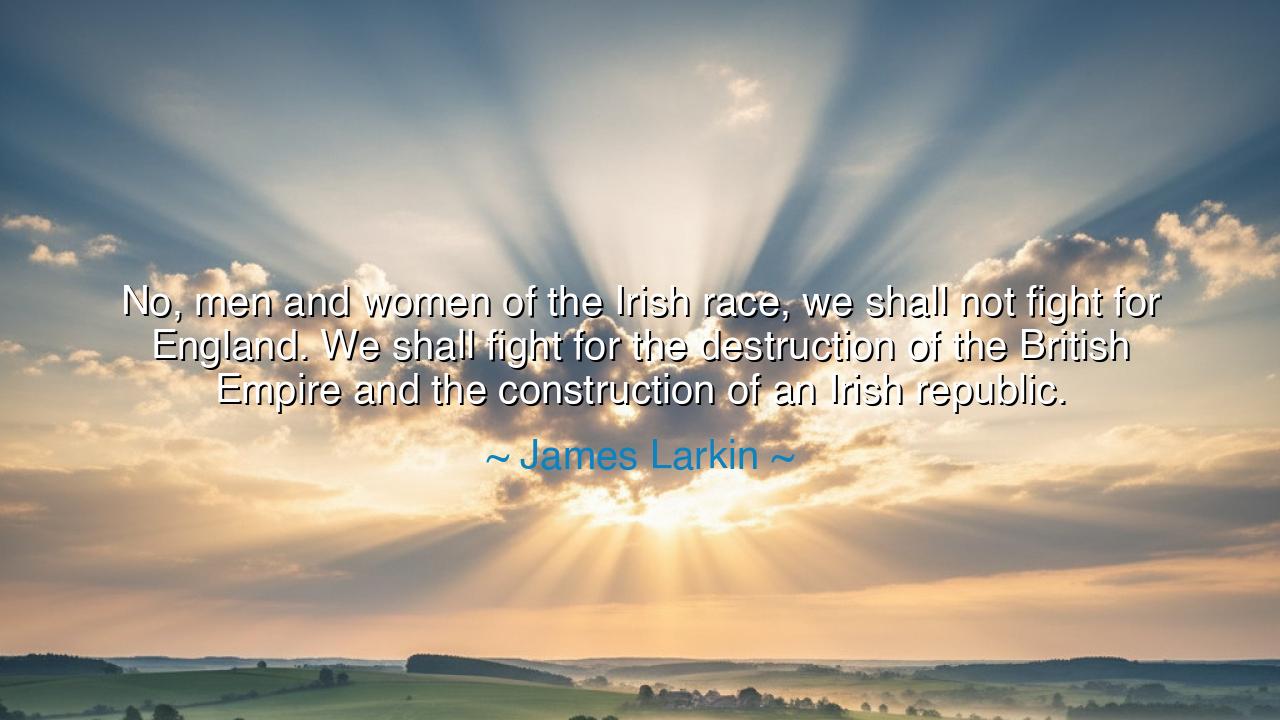
No, men and women of the Irish race, we shall not fight for
No, men and women of the Irish race, we shall not fight for England. We shall fight for the destruction of the British Empire and the construction of an Irish republic.






Hear the fiery words of James Larkin, the labor leader and revolutionary who stirred the hearts of the oppressed: “No, men and women of the Irish race, we shall not fight for England. We shall fight for the destruction of the British Empire and the construction of an Irish republic.” These words were not uttered in calm reflection, but in the midst of struggle, when Ireland lay under the weight of foreign rule and its children bore centuries of poverty, hunger, and humiliation. In this cry, Larkin gave voice to the soul of a people who longed not for service to the crown that had burdened them, but for their own freedom, their own destiny, their own republic.
The origin of these words lies in the turmoil of the early 20th century. Britain called upon Ireland to fight in its wars, to shed blood for the empire that had broken their land and scattered their kin across the seas. But Larkin, champion of workers and foe of tyranny, refused this summons. To fight for England, he declared, was to fight against the very hope of Irish liberty. Better, he said, to turn that courage inward, to struggle not as servants but as sovereigns, to rise against the empire itself and lay the foundation of an Ireland free. Thus, his quote is both defiance and commandment, both rejection of bondage and proclamation of a dream.
History remembers the echo of his defiance in the Easter Rising of 1916. Though Larkin himself was in America at the time, the spirit of his cry lived on in Connolly, Pearse, and the martyrs who took up arms against the empire. They did not fight for England’s cause; they fought for Ireland’s soul. The rebellion was crushed, its leaders executed, yet their sacrifice became the seed of independence. What seemed defeat became victory of another kind, for their blood watered the ground from which the Irish republic would one day rise. In this we see the eternal power of Larkin’s words—that refusal to serve oppression can itself ignite the fires of freedom.
The quote also speaks to a universal truth. Every people, every soul, must ask: for whom do I fight, and for what do I give my strength? To fight for another’s chains is slavery of the spirit. To fight for one’s own liberty is the highest calling. Larkin’s words remind us that the struggle of the oppressed is not merely against hunger or poverty, but against the deeper chains of subjugation. He demanded that his people lift their eyes from the battlefields of empire to the greater battlefield of justice, where the goal was not victory for the master, but freedom for the slave.
The lesson here is not only for Ireland, but for all peoples and all ages. When you are asked to labor, to fight, to sacrifice—ask yourself: does this labor build my own house, or does it build the house of my oppressor? Does this sacrifice secure the freedom of my children, or does it secure only the throne of another? If the answer is the latter, then remember Larkin’s cry: “We shall not fight for England.” It is the refusal of the spirit to bend, the sacred “no” that becomes the doorway to liberation.
And yet, his words also carry a constructive vision: the construction of an Irish republic. It is not enough to destroy; one must also build. Freedom is not merely the absence of chains, but the presence of justice, dignity, and self-rule. Larkin calls his people not only to fight against, but to fight for—to build a republic where men and women alike may walk as equals, where the laborer is honored, where the nation belongs to those who toil within it. Destruction without creation is emptiness, but destruction joined to creation is the very heartbeat of revolution.
Therefore, take this teaching into your own life: do not lend your strength to causes that enslave, but dedicate it to the building of freedom, whether in your family, your community, or your nation. Have the courage to say “no” when the world bids you serve what is unjust, and the courage to say “yes” when liberty and justice call. For in every age, there are empires to resist and republics to build—not always with guns and banners, but with truth, with solidarity, and with the labor of hands joined together. Thus may you carry forward the spirit of James Larkin, whose words remain a torch for all who will not fight for the master, but will rise to build the world anew.






AAdministratorAdministrator
Welcome, honored guests. Please leave a comment, we will respond soon